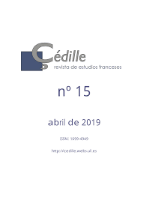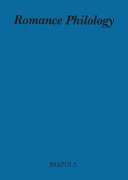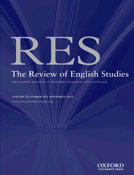
Moenia-Revista Lucense de Linguistica & Literatura
metrics 2024
Unlocking New Perspectives in Language and Literature
Introduction
Moenia-Revista Lucense de Linguistica & Literatura, published by the esteemed Universidad de Santiago de Compostela, is a crucial academic journal dedicated to the fields of linguistics and literary studies. With its ISSN 1137-2346 and E-ISSN 2340-003X, this journal aims to advance scholarly discourse and provide a platform for innovative research in both linguistics and literature, with a particular focus on linguistic theories, literary analysis, and interdisciplinary approaches. The journal is categorized in the lower quartile (Q4) in its respective fields according to the latest metrics, including Scopus rankings, which place it within the challenges of the arts and humanities. Although currently not open access, it serves as an accessible resource for researchers and enthusiasts alike who are keen to explore diverse methodologies and theoretical frameworks. With its commitment to fostering rigorous academic inquiry, Moenia stands as a vital resource for those looking to deepen their understanding of the intricate relationships between language and literature.
Metrics 2024
 0.10
0.10 0.10
0.10 0.10
0.10 4
4Metrics History
Rank 2024
Scopus
JCI (Web Of Science)
Quartile History
Similar Journals

Etudes Romanes de Brno
Advancing Scholarly Discourse in the HumanitiesEtudes Romanes de Brno, published by Masaryk University, Faculty of Arts, is a distinguished academic journal that has been contributing to the fields of Linguistics and Language as well as Literature and Literary Theory since its inception. With an ISSN of 1803-7399 and E-ISSN 2336-4416, this open-access journal has been a valuable resource for scholars since 2009, enhancing accessibility to a broad audience of researchers and students in the Czech Republic and beyond. The journal's impact is underscored by its categorization in the Q2 and Q3 quartiles for literature and linguistic studies as of 2023, reflecting its commitment to rigorous academic discourse. With Scopus rankings placing it in the 57th and 31st percentiles for its respective fields, it continues to attract high-quality submissions that explore contemporary issues in literary studies and language analysis. Etudes Romanes de Brno promises to remain an essential platform for the exchange of scholarly ideas, fostering growth and innovation in the humanities.

Romanica Olomucensia
Exploring the Depths of Romance StudiesRomanica Olomucensia is a distinguished open-access academic journal published by Palacky University, Department of Romance Philosophical Faculty in the Czech Republic. With its commitment to fostering advanced research in the fields of Literature and Literary Theory as well as Linguistics and Language, this journal aims to provide a platform for scholars, researchers, and students to share their findings and insights. Since its inception, Romanica Olomucensia has consistently been recognized for its quality, securing a position in the Q2 category in the literature domain and achieving a Q3 ranking in linguistics per the 2023 category quartiles. The journal is indexed in Scopus, reflecting its standing in the academic community, with impressive ranks in various arts and humanities disciplines. It has been an open-access journal since 2018, promoting unrestricted access to all its publications, thus enhancing global academic outreach. With a focus on innovation and interdisciplinary studies, Romanica Olomucensia serves as an essential resource for anyone interested in the dynamic interplay of language and literature.

Cedille-Revista de Estudios Franceses
Pioneering Research in French Linguistics and LiteratureCedille-Revista de Estudios Franceses is a prominent academic journal published by the ASOC PROFESORES FRANCES UNIV ESPANOLA-APFUE and has established itself as a vital resource in the fields of Linguistics and Language and Literature and Literary Theory. Since its inception in 2005, this Open Access journal has provided a platform for rigorous scholarly articles and critical studies focused on French studies, fostering both research and discussion among academics from around the globe. Originating from Santa Cruz de Tenerife, Spain, Cedille has garnered a respectable impact factor and ranks in the second quartile for Linguistics and Language and the first quartile for Literature and Literary Theory in 2023. With converged years from 2009 to 2024, the journal aims to advance understanding and appreciation of French literature and its linguistic intricacies, serving as a vital forum for researchers, professionals, and students committed to the exploration of French culture and language studies.

Estudios Romanicos
Bridging Disciplines Through Open Access ResearchEstudios Romanicos, published by the Universidad de Murcia, is an esteemed open-access journal that has significantly contributed to the fields of Linguistics, Language, Literature, and Literary Theory since its inception in 1978. With an impact factor that elevates it to Q3 in Linguistics and Language and Q2 in Literature and Literary Theory as of 2023, this journal ranks impressively within its categories—placing it in the 76th percentile for Literature and Literary Theory, making it an essential resource for academic discourse. Based in Murcia, Spain, the journal embraces an open-access model, ensuring that its rich content is accessible to a global audience—fostering collaboration and cross-disciplinary research. The convergence of knowledge from diverse linguistic and literary perspectives allows researchers, professionals, and students alike to engage with cutting-edge scholarship and extend the boundaries of their own studies.

NEOPHILOLOGUS
Advancing the Frontiers of Linguistics and LiteratureNEOPHILOLOGUS, published by Springer, stands as a pivotal journal in the fields of Linguistics and Language as well as Literature and Literary Theory. With an illustrious history dating back to 1916 and continuing through various phases until 2024, this journal has entrenched itself as a crucial platform for scholarly discussion and research dissemination. NEOPHILOLOGUS is recognized for its high academic standards, as evidenced by its impressive category quartiles, ranking in the Q2 tier for Linguistics and Language and Q1 for Literature and Literary Theory as of 2023. Notably, it ranks in the 81st percentile for Arts and Humanities in the Scopus database, underscoring its significant contribution to the humanities discourse. While the journal does not currently offer open access options, it remains a valuable resource for researchers, professionals, and students seeking in-depth analyses and insights within its specialized domains. Based in Dordrecht, Netherlands, NEOPHILOLOGUS invites contributions that advance our understanding of linguistic and literary phenomena, ensuring its relevance and impact in these dynamic fields.

MESTER
Advancing Cultural Discourse and Literary InsightsMESTER is a distinguished academic journal published by the UCLA College of Humanities, known for its commitment to advancing research in the fields of Cultural Studies, Linguistics and Language, and Literature and Literary Theory. With an ISSN of 0160-2764, this journal serves as a vital platform for scholars and professionals to disseminate innovative research and critical perspectives from diverse theoretical frameworks and cultural contexts. Although currently operating without an Open Access model, MESTER continues to uphold a rigorous peer-review process, ensuring that published articles maintain high academic standards. Recognized for its selective focus, MESTER holds a Q4 categorization in Cultural Studies and Linguistics, and Q3 in Literature and Literary Theory, situating it as a relevant, if emerging, voice within these disciplines. Housed within the significant repository of knowledge at UCLA, the journal beckons researchers, students, and practitioners to engage with its contributions to the humanities and build upon its foundations in cultural discourse.

Studien zur Deutschen Sprache und Literatur-Alman Dili ve Edebiyati Dergisi
Fostering global access to Germanic scholarly discourse.Studien zur Deutschen Sprache und Literatur-Alman Dili ve Edebiyati Dergisi is an esteemed academic journal published by ISTANBUL UNIV, FAC LETTERS, dedicated to the vibrant exploration of German language and literature, alongside critical studies in cultural contexts. Operating with an Open Access model since 2017, the journal facilitates unrestricted dissemination of knowledge, ensuring accessibility for researchers, educators, and students worldwide. Based in Turkey, this journal plays a significant role in the scholarly community, as evidenced by its rankings in Cultural Studies, Linguistics, and Literature and Literary Theory. Although it currently holds a Q4 ranking in Cultural Studies and Linguistics and a Q3 ranking in Literature for the year 2023, it offers invaluable perspectives that contribute to ongoing dialogues in these fields. The journal has established convergence from 2021 to 2024, creating a cohesive platform for the latest research and discussions in German linguistics and literary theory, and invites submissions from scholars aiming to enhance the understanding of the Germanic domain.

ROMANCE PHILOLOGY
Exploring the Depths of Romance Languages and LiteraturesROMANCE PHILOLOGY is a distinguished academic journal dedicated to the exploration of language, literature, and linguistic theory within the Romance language family. Published by BREPOLS PUBL, it offers a platform for scholars, researchers, and practitioners to disseminate their findings and engage with the latest developments in these fields. The journal's impact factor reflects its standing, positioned within the Q4 category in Linguistics and Language and Q3 in Literature and Literary Theory for 2023, making it an essential resource for those studying Romance philology. Although coverage in Scopus was discontinued in 2021, the journal maintains a commitment to rigorous academic standards and comprehensive peer-review processes. With a broad scope encompassing theoretical and practical aspects of Romance languages and literatures, ROMANCE PHILOLOGY invites contributions that push the boundaries of knowledge and enrich the academic dialogue surrounding these vital areas of study. For those passionate about linguistic and literary pursuits, this journal stands as a significant gateway into the evolving discourse of Romance studies.

Philologica Canariensia
Elevating scholarly communication in the humanities.Philologica Canariensia is a distinguished academic journal published by the University of Las Palmas de Gran Canaria, focusing on the vibrant fields of Literature and Literary Theory as well as Linguistics and Language. With an impact factor that positions it in the Q1 and Q2 quartiles in its respective categories as of 2023, the journal has established itself as an important platform for scholarly communication and research. Since transitioning to Open Access in 2014, it has broadened its reach, allowing researchers, professionals, and students from around the globe to access high-quality publications without barriers. With a commendable presence in Scopus rankings, including a rank of #309 out of 1106 in Literature and Literary Theory, Philologica Canariensia aims to foster an interdisciplinary dialogue and advance knowledge in the humanities. The journal's commitment to publishing innovative research makes it an essential resource for anyone engaged in exploring linguistic and literary phenomena.

REVIEW OF ENGLISH STUDIES
Illuminating the Landscape of Literary TheoryREVIEW OF ENGLISH STUDIES, published by Oxford University Press, is a prestigious journal that has been advancing the fields of Literature and Literary Theory as well as Linguistics and Language since its inception in 1925. With an impressive impact factor and a commendable ranking, placing it in the Q1 and Q2 categories across relevant disciplines, the journal serves as a vital platform for researchers, scholars, and students alike. Covering a wide range of topics from classical literature to contemporary linguistic analysis, REVIEW OF ENGLISH STUDIES is committed to fostering scholarly discourse and promoting innovative research methodologies. Although it does not offer open access, the journal is highly regarded for its rigorous peer-review process and high-quality publications, making it an essential resource for anyone engaged in English studies. For researchers seeking to keep abreast of the latest developments in the field, this journal stands as an indispensable guide and repository of knowledge.